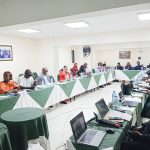- December 12, 2024
- Posted by: Precious David
- Category: Uncategorized

On November 25, 2024, a policy dialogue on sustainable energy transition took place at the Stratton Hotel, Asokoro, Abuja. Organized by the Natural Resource Governance Institute (NRGI) and the Africa Initiative for Transparency Accountability and Responsible Leadership (AfriTAL), the event explored the interplay between Nigeria’s gas and renewable energy pathways.
With Nigeria committed to achieving net-zero emissions by 2060, the dialogue served as a platform to discuss aligning the nation’s Decade of Gas (DoG) initiative with its renewable energy ambitions, ensuring a coherent, sustainable energy transition strategy.
Why This Dialogue Matters
Nigeria’s Energy Transition Plan (ETP) and pro-renewable policies like Vision 30:30:30 demonstrate intent, but gaps remain in integrating gas and renewables into a unified framework. The risks, trade-offs, and potential conflicts between these energy sources require urgent attention to secure a sustainable and equitable energy future.
Key Highlights
Welcome Address by Dr. Louis Ogbeifun (AfriTAL)
Dr. Ogbeifun emphasized the importance of equity in Nigeria’s energy transition, noting systemic challenges and Africa’s limited share (3%) of global transition investments. He highlighted the potential for conflict if vulnerable communities are excluded and urged for synergy among stakeholders to achieve a just transition.
Opening Remarks by Tengi George-Ikoli (NRGI)
Ms. George-Ikoli stressed the need for complementarity between gas and renewable pathways to safeguard Nigeria’s credibility and ensure successful policy implementation. She urged participants to scrutinize policies for clarity and alignment, emphasizing the role of stakeholder collaboration in achieving realistic solutions.
Goodwill Messages from Partners
Representatives from NLNG, NIAF, and NEITI echoed the importance of data-driven strategies and self-reliance in driving Nigeria’s energy goals.
Presentations
- NRGI: Challenges in balancing gas and renewables include infrastructure deficits, safety concerns, and limited investment. Recommendations included creating hybrid energy programs and strengthening local technical capacity.
- Ghana’s E-Mobility Case Study: Doris Agbevivi shared insights on integrating renewable energy into Ghana’s transportation sector, emphasizing digitalization and phased implementation.
Panel Session
The session featured industry and government representatives discussing the challenges of policy integration and commitments to decarbonization. Panelists highlighted the importance of adaptable gas infrastructure and investment in renewable energy.
Emerging Issues
- Lack of alignment in Nigeria’s energy frameworks.
- The need for labor transition strategies to mitigate employment impacts.
- Limited technical capacity for renewable energy project design.
- Ambiguity in policy and regulatory roles, hindering governance.
- Missed opportunities to integrate gas and renewables.
Recommendations for a Sustainable Energy Transition
- Strategic Complementarity: Align gas and renewables under a unified energy strategy.
- Resource Allocation: Balance investments between gas infrastructure and renewable projects.
- Policy Integration: Establish a task force to review and harmonize energy policies.
- Environmental Trade-offs: Incorporate life-cycle emissions assessments into planning.
- Investment Synergies: Develop hybrid energy projects, like solar-powered gas facilities.
- Demand-Driven Policies: Use comprehensive energy demand assessments to inform policies.
- Labor Transition Plans: Collaborate with industries and educational institutions to reskill workers.
- Infrastructure Adaptability: Design gas systems for future renewable integration.
- Bankable Renewable Projects: Enhance technical capacity and foster international partnerships.
- Centralized Coordination: Create an agency to unify energy transition efforts.
Way Forward
The dialogue underscored the urgency of adopting an integrated approach to Nigeria’s energy transition. By balancing gas and renewable energy pathways, Nigeria can enhance its energy security, meet its net-zero goals, and serve as a model for equitable transition in Africa.
Collaboration among stakeholders, clear policies, and investments in technical capacity will be critical. The energy transition is not just a national goal—it’s an opportunity to lead globally while fostering local resilience and sustainability.
#EnergyTransition #Sustainability #NigeriaEnergyPolicy #GasAndRenewables #ClimateAction #NetZero2060





